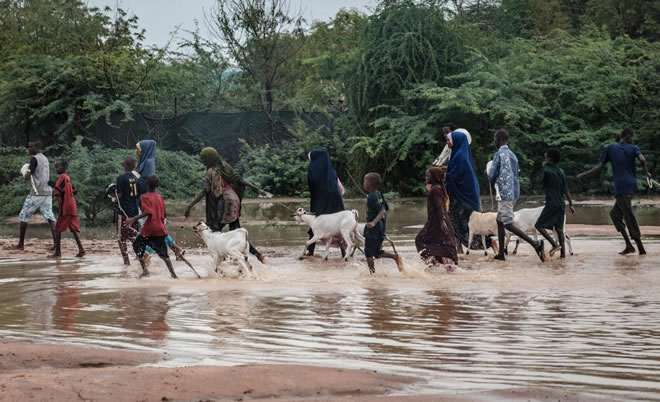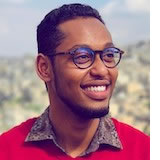
Refugees walk with their goats in floodwaters at the Dadaab refugee complex, in the northeast of Kenya, on April 17, 2018. YASUYOSHI CHIBA/AFP VIA GETTY IMAGES
 by Abdullahi Alim
by Abdullahi Alim
Tuesday, April 6, 2021
Ty McCormick’s Beyond the Sand and Sea is a heart-wrenching story that chronicles the life of a Somali family trapped in a seemingly endless state of statelessness. The book demonstrates how the global migration system—mired in bureaucratic inefficiencies and populist fervor—relegates refugees to a permanent state of displacement, marginalization, and trauma that prevents them from truly moving forward.
For readers like me, who are so often heralded as the “good immigrant,” the book conjures deeper questions steeped in guilt: Why me?
I was born in 1992 during the height of Somalia’s civil war and famine that eventually displaced millions of people in the Horn of Africa and earned Somalia the title of a failed state. In 1998, my family and I were eventually granted asylum in Australia. Why was my family granted asylum over others? And am I, more than 20 years later, truly beyond the sand and sea—or are my present-day ambitions (and dysfunctions) still remnants of those formative years?
In the stillness that only a pandemic-induced isolation can offer, the book posed another, more existential question: Has my status as a model minority, marked by the rosy narrative of a young Somali refugee who excelled in school and the larger world, helped elevate the voices of others? Or has it unwittingly validated the dangerous narrative of the good vs. bad refugee, which chastises those whose deeply held trauma blocks them from a similarly successful life?
Beyond the Sand and Sea is set against the backdrop of one of the most politicized and securitized areas of the world: Dadaab. Situated in Kenya’s far east, it is home to one of the largest refugee camps in the world, mostly inhabited by the survivors of the civil war in neighboring Somalia. McCormick presents the reader with a glaring visual. What does it feel like to be stateless? What does it feel like for a once nomadic people, guided by seasons and vast terrains, to be bound by the confines of a refugee camp—knowing that this, too, could change adversely at the flick of a switch? (The Kenyan government has repeatedly threatened to close Dadaab—a dire outcome that would leave the most vulnerable to essentially fend for themselves.)
The average resident in Dadaab waits about 17 years in hopes of relocation. As the book shows, some are born in the camp with a yearning for the outside world, and some eventually die there, too. Inevitably, time and place are warped measurements for the residents whose understanding of the world is limited to the parameters of the camp and who’ve simply lost faith in the passing of time.
The name of a local market (fittingly referred to as Bosnia), within miles of the camp, demonstrates this warped geography. Over time, this is bound to also narrow the psychological horizons of residents who are rendered incapable of making simple decisions—including competing for a once-in-a-lifetime scholarship opportunity or attending a job interview on time.
When officials interact with refugees, they typically decouple them from their trauma. In doing so, they are unable to appreciate examples of disruptive behaviors typically associated with the “bad refugee,” who is seemingly ungrateful and undeserving of resettlement. On the flip side, there is the “good refugee,” captured in the story of the book’s main protagonist, Asad, who defies all odds and eventually lands a spot at Princeton University.
In more ways than one, he and I are extensions of the same narrative; we are children of the 1991 civil war—well-educated prototypes of the model refugee whom officials love to laud. However, the spotlight afforded to us can sometimes come at a cost that is borne by those who have fallen through the cracks.
In the case of Maryan, Asad’s older sister, who is granted asylum decades before the rest of the family, her U.S. employer seems to consider her through this lens. With high blood pressure, crippling anxiety, and an abusive partner, she would often find herself unable to hold back tears during working hours and missed work on three separate occasions, which eventually led to her firing.
Her story, marked by suicide attempts and deteriorating health, is a lament for the millions of refugees who in the midst of a new environment, the unraveling of years of pent-up trauma, fractured family dynamics, and low wages find that they are unable to live up to the caricature of the model minority and end up sequestered on the margins of society. Worse still, their lives are often marked by limited employment, which serves as fodder for populist narratives that depict them as a drain on Western society, which further perpetuates their marginalization.
Like so many other refugees, Maryan must also contend with another hurdle: the psychological cost of upward mobility. In her book Moving Up Without Losing Your Way, the philosopher Jennifer Morton presents a critique of the American Dream that often underscores the psychological disconnect borne by those who are the first in their community or family to venture into new terrain.
This phenomenon—marked by isolation, guilt, and an inability to live in the present—affects many people, from working-class kids at elite universities to underrepresented minorities working at predominantly white Wall Street institutions. But this feeling is particularly pronounced for refugees contending with class, racial, religious, and ancestral anxieties as they trade all that was familiar to them for the potential of upward mobility.
Abdullahi Alim leads the World Economic Forum’s network of emerging young leaders, known as the Global Shapers, across Africa and the Middle East. He can be reached at @abdullahialim
This article was first published on Foreign Policy